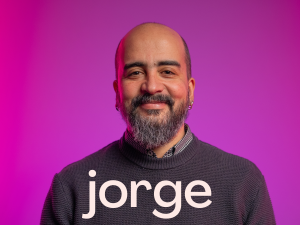‟ I think the funny assumption about researchers and scientists is this image of crazy people with Einstein hair, going crazy in the lab, doing crazy stuff. In reality, we’re just normal people.”
This is Jorge Meira’s story. The native Brazilian initially had a huge passion for music. But he decided to embrace his “inner nerd” and pursued a path that would lead him to training machines to learn. Today, his research on AI-driven logistics tackles a pressing challenge: how can we optimise delivery routes as global supply chains grow increasingly complex?
Relive the conversation—transcript below!
What is your background and what brought you to Luxembourg?
My background is in computer science — I completed my bachelor’s and master’s in Brazil. During my studies, I became increasingly interested in databases, big data, and more recently, machine learning. I joined SnT in 2012 for my PhD, then returned to Brazil to teach before coming back as a post-doc to SnT. So I’ve kind of come full circle!
What inspired you to pursue a career in research?
I didn’t plan to pursue a career in research initially, but during my bachelor’s degree, I started working with researchers on small projects and found it fascinating. My biggest inspiration has been my brother, who has a PhD in chemistry. When I was in my bachelor’s programme, he was already pursuing his PhD, which made him a role model for my academic journey.
How would you describe your research focus and its real-world applications?
My research is about training machines to learn and solving real problems with industry partners. Currently, I’m working with a logistics company called Eurosender to optimise delivery routes. When companies have many trucks making numerous deliveries, the process becomes too complex for manual planning. We apply AI to help them create more efficient delivery schedules and routes.
What’s the most underrated skill in tech research?
Patience, without a doubt. You work hard on projects and papers that take a long time to be accepted. Building your research team also requires patience.
‟ In this field, you don’t do things for immediate results—you think long-term. Everything takes time.”
If your teenage self could see you now, what would he think?
I think he’d be happy and interested in what I’m doing. He might be surprised about me becoming a researcher—that wasn’t specifically what I had in mind back then—but working with mathematics was always something I knew I wanted to do from the beginning.
What challenges did you face when entering the computer science field?
Initially, I wasn’t sure I’d fit in because I was always into music before. I was torn between music and computer science. Being in a place with ‘all the nerds’ was challenging at first, but I adapted quickly. Deep inside, I think I was a big nerd myself, which helped me connect.
How did you find the environment at SnT when you joined?
I felt very welcome from the beginning because of the multicultural environment. Many people were like me—without family here, just trying to figure things out. This created a supportive atmosphere.
How do you think we can encourage more diversity in tech research?
The notion that men are better at maths isn’t true—I have many amazing women colleagues who are great mathematicians. Things are improving gradually through initiatives from governments, teachers, and professors, but we still have work to do.
‟ We need to start from childhood by challenging stereotypes about who belongs in STEM fields.”
Supported by the Luxembourg National Research Fund
